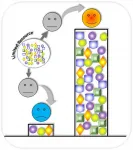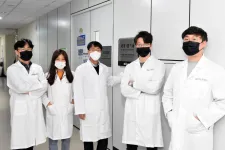INFORMATION:
Examples of these sounds are available from Alexiane Agullo : alexiane.agullo@cnrs.fr
Notes:
[1]Prosody refers to the "melody" of a phrase or word: its pitch, rate, and intensity.
[2]Jean-Julien Aucouturier now works at the FEMTO-ST laboratory (CNRS/Université de Bourgogne-Franche Comté/ENSMM/UTBM), and Louise Goupil at the University of East London.
[3]Scientists used vocal signal processing techniques to create random pronunciations of words (rising pitch, falling pitch, etc.), and then asked multiple groups of participants whether these words were pronounced with certainty or honesty. The software they developed as part of this effort, CLEESE, is open source: https://forum.ircam.fr/projects/detail/cleese/
Recognizing liars from the sound of their voice?
2021-02-08
(Press-News.org) Faster speech rate, greater intensity in the middle of the word, and falling pitch at the end of the word: that is the prosody[1] to adopt if one wants to come across as reliable and honest to one's listeners. Scientists from the Science and Technology for Music and Sound laboratory (CNRS/Ircam/Sorbonne Université/Ministère de la Culture)[2] and the Perceptual Systems Laboratory (CNRS/ENS PSL) have conducted a series of experiments[3] to understand how we decide, based on the voice, whether a speaker is honest and confident, or on the contrary dishonest and uncertain. They have also shown that this signature was perceived similarly in a number of languages (French, English, Spanish), and that it is registered "automatically" by the brain: even when participants were not judging the speaker's certainty or honesty, this characteristic sound impacted how they memorized the words. Prosody consequently conveys information on the truth-value or certainty of a proposition. Scientists are now trying to understand how speakers produce such prosody based on their intentions. This research was published on 8 February in Nature Communications.
ELSE PRESS RELEASES FROM THIS DATE:
Hearing acrobatics
2021-02-08
The sense of hearing is, quite literally, a molecular tightrope act. Turns out, it involves acrobatics as well.
In a paper published in Nature Communications on Feb 8, researchers at Harvard Medical School and Boston Children's Hospital show that a dynamic and delicate connection between two pairs of diminutive protein filaments plays a central role in in hearing.
The tension held by these filaments, together called a tip link, is essential for the activation of sensory cells in the inner ear. The team's analyses reveal that the filaments, which are joined end-to-end, work together like trapeze artists holding ...
Coal and COVID-19: How the pandemic is accelerating the end of fossil power generation
2021-02-08
COVID-19 has not only caused a temporary drop in global CO2 emissions, it has also reduced the share of power generated by burning coal - a trend that could in fact outlast the pandemic. This is the key result of a new study by a team of economists based in Potsdam and Berlin that looked at COVID-19's impact on the energy system and demand for electricity. Their findings show that the pandemic, while putting a terrible toll on people's lives and the economy, has also opened a window of opportunity to make this current trend of decreasing coal use irreversible: Supported by the right climate policy measures, power sector emissions could decline more rapidly than previously thought.
"Coal has been hit harder by the Corona crisis than other power sources - and the reason is ...
Higher blood pressure at night than in daytime may increase Alzheimer's disease risk
2021-02-08
Higher blood pressure at night than in daytime may be a risk factor for Alzheimer's disease in older men. This is suggested by a new study from researchers at Uppsala University, now published in the journal Hypertension.
'Dementia' is an umbrella term used to describe a category of symptoms marked by behavioural changes and gradually declining cognitive and social abilities. Numerous factors, including hypertension (high blood pressure), affect the risk of developing these symptoms.
Under healthy conditions, blood pressure (BP) varies over 24 hours, with lowest values reached at night. Doctors call this nocturnal blood pressure fall 'dipping'. However, in some people, ...
Winner-takes-all synthetic gene circuit process opens new pathways to disease treatment
2021-02-08
A new process for inserting synthetic gene circuits into host cells, developed by a team of bioengineers at Arizona State University, has broad implications for improving the effectiveness of a range of disease therapies.
Synthetic biology is an interdisciplinary research field that uses engineering principles to create biological components that don't exist in the natural world. These synthetic components mimic naturally evolved organisms, but are customized to fight disease, including cancer.
A paper recently published in Nature Communications, "Winner-Takes-All Resource Competition Redirects Cascading Cell Fate Transitions," outlines how gene circuits can be reconfigured so that they do not overwhelm the host cells.
"We ...
79% decrease in primary care visits, 56-fold increase in virtual care: COVID-19 pandemic
2021-02-08
In the early months of the COVID-19 pandemic, there was an almost 80% decrease in primary care office visits in Ontario and a 56-fold increase in virtual visits, found new research in CMAJ (Canadian Medical Association Journal).
"Initial reports from primary care providers during the pandemic in both Canada and the United States showed major disruptions to care, decreased payments, challenges keeping offices functioning, lack of personal protective equipment and widespread uptake of virtual care, but we didn't know how COVID-19 had affected in-person office visits," says ...
Study links exposure to nighttime artificial lights with elevated thyroid cancer risk
2021-02-08
People living in regions with high levels of outdoor artificial light at night may face a higher risk of developing thyroid cancer. The finding comes from a study published early online in END ...
Survey: Most Americans say they'll continue health precautions after COVID-19
2021-02-08
A new national survey of more than 2,000 Americans by END ...
Scientists switch on tissue repair in inflammatory bowel disease
2021-02-08
A method that instructs immune system cells to help repair damaged tissues in the intestine has been developed by researchers at KU Leuven and Seoul National University. This opens the way for more effective treatment of inflammatory bowel disease, including ulcerative colitis and Crohn's disease. The study was carried out on humans and mice.
When functioning correctly, the immune system protects against harmful agents such as bacteria that get into the body. But in conditions such as inflammatory bowel disease (IBD), the immune system attacks the tissues that line the gut, forming ulcers and causing pain and discomfort. Nearly 3.9 million women and 3.0 ...
Front-of-package product names and ingredient lists of infant and toddler food can be hard to navigate
2021-02-08
Philadelphia, February 8, 2021 - Early exposure to nutritious foods may help children develop more healthful eating habits, but package labels can make it difficult for parents to understand what they are feeding their young children, according to a END ...
Rapid, reliable on-site drug detection using wearable sensor
2021-02-08
Researchers in South Korea have successfully developed a wearable sensor that can detect illegal drugs in sweat by using nanomaterials technology that amplify the optical signal of narcotics to a flexible, body-worn material. Led by Dr. Ho Sang Jung, the research unit is part of the Korea Institute of Materials Science(KIMS), a government-funded research institute under the Ministry of Science and ICT.
The technology enables fast and highly sensitive drug detection: the sweat patch is attached to the skin for a certain period of time and then irradiated with light for testing. It only takes one minute without requiring additional process.
Traditional drug detection process requires a complex method of extracting suspected drug components from ...

